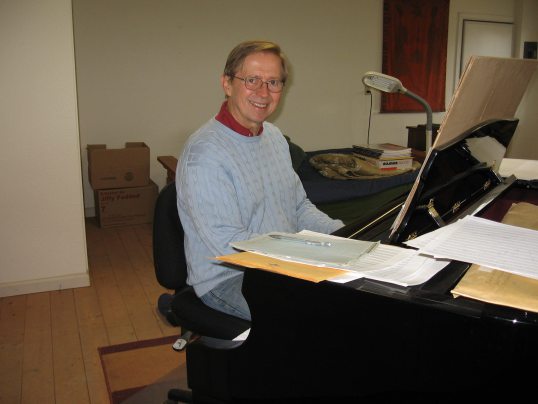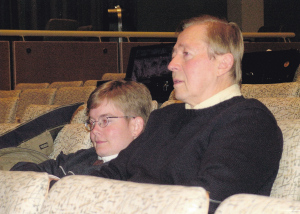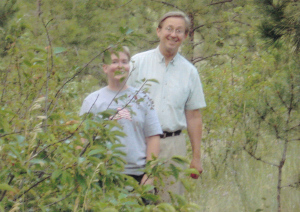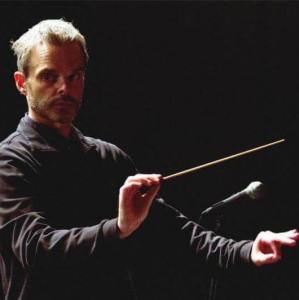2. Mentors (August 2017)
 Sunday, August 13, 2017 at 7:00PM Comments Off
Sunday, August 13, 2017 at 7:00PM Comments Off  David Maslanka in his home studioMost of us became musicians because someone mentored us. It's not easy to guide a young musician, but that's why our mentors are special, why they inspire us. They care for us and they know us, and because of that, we flourish.
David Maslanka in his home studioMost of us became musicians because someone mentored us. It's not easy to guide a young musician, but that's why our mentors are special, why they inspire us. They care for us and they know us, and because of that, we flourish.
When I was first-year doctoral student, composer David Maslanka visited UT-Austin. He was already famous and I already knew how he revolutionized the concert band world forever with his Symphony no. 2. There he was, alive, in person, on my campus! I couldn't wait to meet the guy whose music left me exhausted and joyful, tearful and energized at the same time.
To my surprise and dismay, he turned out to be Weird, capital W, even compared to most composers. He mumbled about his dreams, about meditating and having conversations with creatures there, about reaching into a space beyond oneself that I simply wasn't prepared to accept. He had such a strict diet it was impossible to find restaurants for him. He rambled at the microphone before his performances. Still, I offered to drive him back to the airport to have time alone with him, to get another measure of him.
There, gripping the steering wheel in the silence, I finally blurted out, "Dr. Maslanka, I love your music and I heard every word you said while you've been here but I think you're full of <bleep>." (I didn't say "bleep.")
Looking back now, I can't believe I did that. David just smiled and asked, "What don't you believe?" Those 40 minutes flew by. We shook hands at the airport and he said, "You're going to call me someday. You'll know when you need to and here's my number." I drove home thinking he was a nice enough guy but no way would I ever call him.
Then my best friend was killed in a car accident and I found myself writing what I intended to be a symphony. I was overwhelmed by rage and grief, unable to handle the new kind of music that was pouring out. I was frightened at how different the whole world felt, engulfed by the loss of my friend, and how different I felt even within myself. Who could I talk about this with who would understand, much less help me make sense of it?
 David and me at an Illinois State University rehearsal
David and me at an Illinois State University rehearsal
I called David after all ... and a mentorship of almost two decades began.
I didn't always like that mentorship. When I went through a phase of writing commercial music for a publisher, David told me to either honor my musical power or stop wasting his time. He told me once that if I wouldn't name myself a "composer" first, rather than "teacher," then I ought to accept that my contribution to music will be little more than grading 4-part chorales. I loved David's frank sarcasm when it wasn't aimed at me, but he could really sting me about blunders in craft. Sure, I should've known better than to do dumb stuff like that, but I had succumbed to out of impatience -- which he knew and wouldn't tolerate.
I asked him once how he could stand that I'd make progress with his help but then screw it up, make progress again but then screw it up, never a straight line of development. He smiled with that mischievous glint and asked me to name one person I'd ever known who developed in a straight line.
I told him once that he saved me; he responded, "You're worth saving."
With David as my mentor, I became aware of bigger pictures, of the universal and cyclical nature of things, from composing to politics to life and relationships. I didn't believe everything he professed, but some of it started to seem possible ... certainly, I believed what he told me was absolutely his own reality. Over the years, David and I corresponded sometimes weekly about doubt, complacency, and fatigue, which are normal but must be faced and overcome. We talked about passion and energy, about connecting with like-minded people and working in solidarity to change the music world, the education world, or any part of the world for the better. He encouraged my skeptical attempts at meditation and both interpreted and praised the results. He shared his love of history and drew me in. I tried to interest him in science fiction but gave up after his comments like "glacial" and "grim and frowning."
We never discussed anything so concrete as harmony or counterpoint, but my sharing a sketch and asking for feedback resulted in the most intense musical discussions of my life, spanning craft and heart, technique and intution equally. We attended performances of each others' music. He stayed with me in Edwardsville a few times and my new dog bit him. We took innumerable walks together and cooked good food.
I have never laughed so hard, nor felt so vulnerable and safe at the same time. I loved David and he loved me. I occasionally beat him at Scrabble.
 David and me trail walking in Missoula, M
David and me trail walking in Missoula, M
Earlier in the summer, David told me he was "ill" but felt certain it was not the end and that he had more music to write. I'd heard his illness was far more serious than that but decided to take him at his word -- after all, his reality always seemed possible because he so firmly knew it was. So I shared a little of what I'd been doing and he responded with pride about my taking on leadership in a new faculty union. I was afraid he'd criticize yet another distraction from composing; instead, he reached back almost twenty years to analyze how inevitable and perfect a step it was in a longer growth process, and praised me for finally learning to face fear and anxiety. He mused that when this personal power someday combines with my musical power the world will be amazed; it wasn't a speculation but a firm statement of fact. He reminded me for the bazillionth time that I ought to write a book, or at least keep a blog, and I responded as I always have that there are only 24 hours in a day. This, while he surely knew that his wife was going to pass away very soon and that he was far more than just "ill."
He never let on.
When David died weeks later, not long after his wife, I suspect he went peacefully and with acceptance. For me the grief is still fresh. He often likened me to "Luke Skywalker with his laser sword," so it's fitting to point out that like Obi-Wan Kenobi, David remains all around me, in everyone he mentored and in all the lives he touched. His music is part of my music and inevitably part of my students' music, too. His power, his surety and sheer force of will, his own hope, his sarcasm and humor, is now part of my power. He gave it to me in every thought, every kind word, every hug, every mischievous glint, and yes, every stern admonishment. He was my mentor and I am better for him. That's what mentors do.
In a matter of hours I will stand in front of a new class on their first day as music majors. For some of them, maybe I will be a mentor. Regardless, I bring them myself and David, and that makes me less sad. These new students very well might start out thinking I'm full of <bleep>, too, and that's okay. That's how the cycle works. I will smile and be there for anyone who calls.
